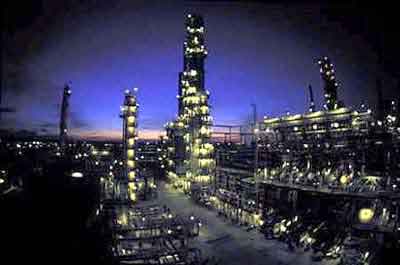
Washington - It's a good time to be in the oil refinery business. Demand for gasoline is high and profits are pouring in at a record clip.
With that combination, you'd think oil companies would be falling over each other to build new refineries. Not so. There hasn't been a new refinery built in the United States in 28 years and more than 200 smaller facilities have closed.
Refining never has been viewed as a cash cow by the petroleum industry, which complains about meager profit margins, hefty environmental costs and too much government regulation.
But with gasoline prices hovering at $2 a gallon for much of this year, the country's largest oil companies and independent refiners are expected to report soaring profits from refinery operations.
For example, Sunoco Inc. recently reported a $217 million profit from refining related business, quadruple the total from a year ago.
Refineries set production records during the first half of the year, churning out 8.6 million barrels of gasoline a day, but still couldn't keep up with demand, the American Petroleum Institute reported.
Still, a refinery in California is expected to shut its gates this fall. Two Texas refineries have been on the market for three years with no takers. And an offer by Saudi Arabia to help build several U.S. refineries brought not even a hint of interest on Wall Street. A project in Arizona has yet to break ground after five years of trying.
"Today investors are in no mood for refinery building even if funding were available," Arjun Murti, managing director of Goldman, Sachs Co., told a recent congressional hearing on refining capacity.
In 1981 the country had 324 operating refineries; today there are 149. They have been running at an average of 96 percent capacity but are unable to keep up with demand. Only gasoline imports have prevented gas lines.
Many of the closed refineries were small, inefficient and "living on tax credits" when the country had too much refining capacity, says Guy Caruso, head of the Energy Information Administration.
Meanwhile, the large, efficient refineries have become bigger. Over the last six years, refiners added 1.2 million barrels of production capacity, equivalent to building one additional medium-size refinery each year, according to the EIA, which keeps energy statistics for the government. At the same time, demand grew by 1.4 million barrels a day.
But efficiency improvements -- called "de-bottlenecking" within the industry -- can only go so far, industry experts said.
Demand for refined products, especially gasoline, is expected to grow at an annual rate of 1.6 percent for the rest of this decade, requiring an additional 260,000 barrels a day of gasoline and other fuels each year, according to Goldman Sachs.
So why is there no interest in building more U.S. refineries?
The capital cost is estimated at $2 billion to $3 billion with no certainty that today's glowing profits will last, say economists. And, despite billions spent on pollution controls, refineries do not make pleasant neighbors.
"Nobody seems to want to build a refinery in their back yard," David O'Reilly, chairman of ChevronTexaco, told a U.S. Chamber of Commerce luncheon the other day, deploring what he said was a regulatory morass and almost certain citizen opposition to any new refinery project.
Given the obstacles, "most companies are unlikely to undertake the significant investment needed to even begin the process" says Red Cavaney, president of the American Petroleum Institute, which represents the large oil companies in Washington.
"The 10-year average return on investment in the industry is about 5.5 percent, about what investors could receive by investing in government bonds with little or no risk," says Bob Slaughter, president of the National Petrochemical and Refiners Association.
But some independent refiners, such as Valero Energy Corp., have been able to reap considerably higher rates of return -- buying old refineries at bargain prices, as little as 20 cents on the dollar.
Valero, the country's largest independent refiner based in San Antonio, has grown rapidly since 1997 by acquiring undervalued refineries, making environmental improvements and expanding capacity.
Such was the case with its purchase of the Orion refinery in Louisiana.
"We paid far less (for it) than the replacement cost. If we had paid full replacement cost for it, it would not be doing well at all," said Gene Edwards, a Valero senior vice president.
Would Valero ever build a new refinery?
"I don't see anyone building a refinery in the U.S. -- maybe overseas," he said.
PIN//Daily Herald
News ID 28180

Your Comment